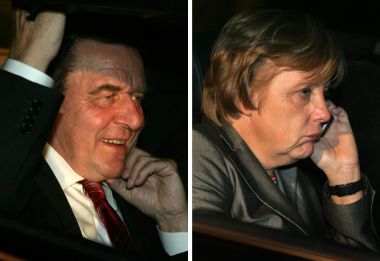|
Conservative Merkel to be named German leader
(Reuters)
Updated: 2005-10-10 16:04
German conservative leader Angela Merkel will become the country's first
woman chancellor under a deal struck with Chancellor Gerhard Schroeder's Social
Democrats (SPD), senior sources from the leading parties said on Monday.
Under the agreement, the SPD is poised to get the foreign, finance, justice
and labour ministries in a new coalition government with Merkel's Christian
Democrats (CDU), a senior SPD source told Reuters.
Schroeder, who has ruled since 1998, is set to relinquish his grip on power
and end three weeks of deadlock since inconclusive elections last month.
Schroeder and Franz Muentefering, the chairman of his Social Democrat party
(SPD), will meet Merkel and her ally, Christian Social Union (CSU) leader Edmund
Stoiber, for a third and probably final time at 11 a.m. (0900 GMT) on Monday.

A combination of two pictures shows Germany's
Christian Democratic Union (CDU) leader Angela Merkel (R) and German
Chancellor Gerhard Schroeder in their limousines after they left talks
between Germany's conservative (CDU/CSU) parties and the Social Democrats
in Berlin October 9, 2005. Schroeder and conservative leader Angela Merkel
delayed resolving a bitter row over who should lead Germany after Sunday
talks to lay the basis for a coalition government of their rival parties.
[Reuters] | The four left a second round of discussions shortly before midnight on Sunday
without saying a word.
The wrangling between the main forces on the left and right comes after a
general election gave neither the conservatives nor the SPD enough votes to rule
with their preferred partners.
Schroeder's SPD, despite winning four fewer seats in parliament than the
conservatives, had refused to relinquish its hold on the Chancellery.
Schroeder's party is expected to extract key concessions from Merkel on
economic policy, resulting in a dilution of the reform agenda she pushed during
the election campaign.
The leaders are expected to hold consultative sessions with their parties
both before and after Monday's talks.
POLITICAL LIMBO
A deal over who leads Germany would open the door to detailed coalition talks
following the most inconclusive election result in postwar German history.
The talks to forge a power-sharing coalition of the country's two largest
parties, dubbed a "grand coalition", are likely to extend into November. It
would be only the second coalition of Germany's top two parties since World War
Two.
Germany has been mired in a political limbo since the September 18 election
and economists have warned that further delay could harm the struggling economy.
Germany's Dax index of leading shares was trading 0.8 percent higher after
the reports that Merkel was to become chancellor.
Financial markets are watching the talks closely to see how much Merkel will
have to dilute her reform plans to appease the SPD and secure the
chancellorship.
If Merkel makes too many concessions it could delay or scupper changes which
economists say Germany urgently needs to boost its growth rate.
German gross domestic product is expected to grow just 1 percent this year,
the weakest rate in the 25-nation European Union. Unemployment hit a postwar
high in February of over 5.2 million people, 12.6 percent of the
workforce.
|